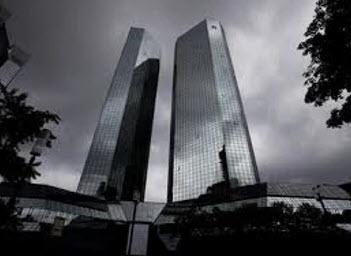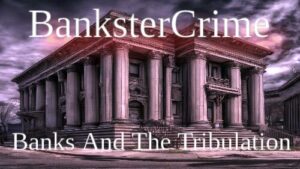
The Institutional Risk Analyst, we review the new book by David Enrich, “Dark Towers: Deutsche Bank, Donald Trump, and an Epic Trail of Destruction.” Enrich is currently a financial editor at The New York Times and was previously an editor at The Wall Street Journal covering financial institutions.


This important book puts in perspective the history of Deutsche Bank AG (NYSE: DB), one of the most mismanaged and politically tainted global banks in modern history. “Dark Towers” also tells the story of how Deutsche Bank provided $2 billion in financing to President Donald Trump, cash that enabled the former real estate developer to continue in business despite his many poor business decisions and credit defaults. As the book makes clear, the only reason that Donald Trump was able to win the American presidency was due to the financial support of Deutsche Bank over more than two decades.
Reading “Dark Towers,” one is left with the impression that Deutsche Bank is less a financial institution and more an ongoing criminal enterprise. We published a negative credit profile of DB earlier this year, but frankly, our assessment was far too generous. Deutsche Bank cut a swath of destruction “and is about the consequences—dead people, doomed companies, broken economies,” Enrich writes, “and the 45th president of the United States—that Deutsche Bank wrought on the world.”
From the founding of Deutsche Bank in the 1870s to the bank’s near failure financing an American railroad baron, to its active support for the Nazis under Adolf Hitler, to its involvement in money laundering, risky derivatives, and the subprime mortgage crisis in the early 2000s, the history of the “German Bank” is a tale of malfeasance and mismanagement that has few equals.
As we said to a senior Fed official last week: Everyone in the Federal Reserve System needs to read this book and ask a basic question: why was this bank not shut down? The simple answer is politics. The Fed and other agencies would not or could not do their jobs as required by US law for fear of the political ramifications in Germany.
“Dark Towers” follows the transformation of Deutsche Bank from a small, relatively low-risk institution that existed after WWII to malignant cancer on the body of global political economy. The bank’s focus on derivatives and investment banking, albeit as a second-rate player in the global capital markets, is presented in simple terms that leave a sense of astonishment, even for veteran risk professionals. The poorly considered strategies, acquisitions, and geopolitical machinations of Deutsche Bank are skillfully described in a concise yet detailed fashion, reflecting hundreds of interviews and thousands of documents obtained during the research for the book.
Enrich follows the tragic careers of Edson Mitchell and his sidekick and best friend, Bill Broeksmit, who took his own life in 2014 when the businesses accumulated within Deutsche Bank starting in the 1980s finally exploded two decades later. Neither the Federal Reserve System, EU regulators, Deutsche Bank’s management nor the German government is spared from the harsh light of scrutiny that this book brings into sharp focus.
The fact that Deutsche Bank laundered billions in dirty money for the likes of Russian dictator Vladimir Putin and others via Deutsche Bank Trust Company in New York raises a basic question about the efficacy of the bank supervision functions of the Federal Reserve, the State of New York and other agencies around the globe. The fact that Deutsche Bank’s US subsidiary was home to both the Trump loans and the money-laundering Russian mirror trades makes the culpability of American regulators even more alarming.
Watchmen, of today are called to speak the word of the Lord from within the court, mounting an internal critique. The pressures on Nathan to keep silent after David seized Bathsheba and sent her husband to his death must have been enormous. He could have vented himself in a scathing editorial and then kept his head down. From all appearances, though, Nathan had free access to the court, was a friend of David, and a close adviser. It is said that prophets spoke truth to power, but that goes beyond cliché when we realize that prophets spoke the truth face to face with power, to powerful men and women whom the prophets knew intimately, frequently from their own position of power.

While the Fed emerges badly tainted from the narrative so skillfully presented in “Dark Towers,” the incompetence and indifference of European regulators and political leaders also are laid bare. The role played by former Deutsche Bank CEO Josef Ackerman, in particular, is painted by Enrich as being extremely damaging to the bank and the global financial system.
Starting from the acquisition of Morgan Grenfell in 1990 and then Bankers Trust a decade later, Deutsche Bank officials oversaw a sharp increase in the bank’s risk-taking activities that were neither prudent nor well-supervised. By the time Ackerman left Deutsche Bank in 2012, the bank was the largest in the word but was also in serious trouble, difficulties that would bring it to the brink of financial failure.
In particular, Ackerman’s obsession with an absurd 25% target for equity returns and his focus on Russia seemed to doom the bank to take ever-increasing risks and violate laws in the search for profits. Enrich writes of Ackerman’s doomed strategy to expand in Russia in the early 2000s:
“Doubling down on Russia with the United Financial acquisition only added to the risks the bank was taking. But this was what it took to achieve Ackermann’s return-on-equity target—especially since Ackermann himself was an unabashed cheerleader of the bank’s expansion into Russia. Just as Georg von Siemens’s entrancement with the United States had led Deutsche into the Henry Villard swamp a century earlier, now Ackermann’s fixation with Russia would spur Deutsche into a similar quagmire. Like Siemens in America, Ackermann was blinded by his fascination with Russian culture and had developed tastes for its theater, opera, and food (blini with caviar was among his favorite dishes). He visited the country as much as once a month, striking up what he described as friendships with some of the bankers in Vladimir Putin’s inner circle.”
At times the story told in “Dark Towers” is extremely sad, particularly following the trail of dead bodies that seemed to follow this very large global banking institution. At other times, the narrative will almost seem absurd to financial professionals as the accumulation of poor management decisions and outright criminality created an impossible situation. Enrich writes:
“Inside Deutsche, some senior executives, including Anshu Jain, warned Mitchell that Bankers Trust was a third-rate institution with a lot of third-rate employees and a deep well of managerial, financial, and accounting problems. Jain expressed his preference to acquire a more conservative and well-respected firm like Lehman Brothers.”
The deliberate indifference to the risk and the overt willingness of Deutsche Bank officials to engage in money laundering, fraud and other wanton acts of criminality raises basic questions about the ability of governments in the EU to regulate financial institutions. Officials up to the board level of Deutsche Bank, for example, apparently were aware of illegal activities such as providing billions in cash to the Revolutionary Guards in Iran, yet did nothing to stop the activity.
Enrich reports that “By 2006, Deutsche had zapped nearly $11 billion into Iran, Burma, Syria, Libya, and Sudan, providing desperately needed hard currency to the world’s outlaw regimes and singlehandedly eroding the effectiveness of peaceful efforts to defuse international crises.” The book seemingly confirms a 2018 lawsuit which alleges that Deutsche played an “integral role in helping Iran finance, orchestrate, and support terrorist attacks on U.S. peacekeeping forces in Iraq from 2004 to 2011.”
The book also documents the role of Deutsche Bank in financing the real estate activities of President Donald Trump, presenting a textbook case of failure to manage credit and reputational risk. The comical situation where one arm of Deutsche Bank refused to lend to Trump while another aggressively pursued his business provides a classic example of “unsafe and unsound” banking practices in the United States. But, again, the Federal Reserve Board and other US regulators repeatedly refused to shut down this renegade institution.
Enrich describes how “for nearly two decades, Deutsche had been the only mainstream bank consistently willing to do business with [Trump]. It had bankrolled his development of luxury high rises, golf courses, and hotels. Over the past eighteen years, the bank had doled out well over $2 billion in loans to Trump and his companies…”
“Dark Towers” is an important and very timely book. It reveals the seamy underside of the world of illicit banking and money laundering but also documents the incompetence of regulators in the US and Europe. This book makes a mockery of American banking and anti-money laundering laws and raises basic questions about the state of prudential regulation on both sides of the Atlantic. The role of Deutsche Bank in these activities was a deliberate choice by management that is impossible to explain away as the result of innocent errors and omissions. Here was a bank that decided that it needed to be large and hyper-profitable, and was willing to do literally anything to achieve these goals.
As readers of The Institutional Risk Analyst know well, when a bank pretends to deliver supra-normal equity returns without excessive risk, you can be sure that there is something wrong with the institution. After reading “Dark Towers,” most reasonable observers will ask one basic question: Why is this bank still open for business at all but specifically in the United States? Sadly, neither officials of the Federal Reserve Board, the US Treasury nor the other agencies responsible for oversight and surveillance of financial institutions and markets have ever been called to account for their failure to supervise Deutsche Bank. Source: ZeroHedge
StevieRay Hansen
Editor, Bankster Crime
MY MISSION IS NOT TO CONVINCE YOU, ONLY TO INFORM YOU…
https://bankstercrime.com/coronavirus-triggers-biggest-shock-to-oil-markets-since-lehman-crisis/
“Have I therefore become your enemy by telling you the truth?”
Deutsche Bank, Oil Drop, Coronavirus, Fraud, Banks, Money, Corruption, Bankers, Federal Reserve Board

![]()



